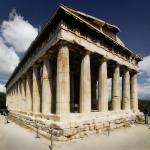|
This section contains 1,040 words (approx. 4 pages at 300 words per page) |

|
The Idea of Four Elements.
Empedocles attempted to find an escape from the logical conclusions of the Eleatic philosophers. Born in the early fifth century B.C.E. in Sicily, Empedocles took on many roles before becoming a philosopher. For a short time he was a politician, and then he turned his attention to educating people on the topics of medicine and religion. When he embarked on his own study of philosophy, he held two very important views. First, he abandoned the accepted belief that all philosophers had held since Thales: that all matter was derived from a single underlying substance. Instead he theorized that the world, as it is known, is due to the mixing and separation of four elements: earth, air, fire, and water, which Empedocles called "roots." Second, he accounted for the blending and the separation of...
|
This section contains 1,040 words (approx. 4 pages at 300 words per page) |

|




